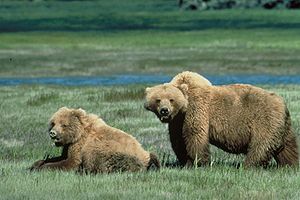 Image via Wikipedia
Image via Wikipedia
I was reminded of it this week when I read of two grizzly bears who were killed in Montana. A mother and two young cubs in Glacier National Park were coming too close to humans and the decision was made to kill the mother. One of the cubs was accidentally killed as a result of the tranquilizer it was given. The other cub was shipped to the Bronx Zoo. If you can't be a grizzly bear in a national park, I'm not what your chances of survival are...
I don't expect to run into any grizzlies in my neighborhood, but we do visit the beaches of Puget Sound and have the potential to run into wildlife there. A recent article in our local paper highlighted the problems of human interaction with seals. Local ranger, Susan Morrow has started a volunteer program, the Edmonds Seal Sitting program, to protect the seals that end up on their shoreline. Mother seals sometimes leave their pups on the beach while they are out fishing. Unfortunately, some people who stumble across these seals get a little carried away with their good intentions, thinking these seals are abandoned or stuck. One recent interaction ended with the death of the seal after it had been transported to someone's bathtub. (How many of us have saltwater coming out of the tap???) Morrow is coordinating volunteers to "seal-sit" when the seals do end up on land. Their job is to post a sign that keeps other people from going near the seal and just to keep an eye on the animal from a distance. Pretty easy babysitting job, if you ask me!
 Image by dan taylor via Flickr
Image by dan taylor via Flickr
I asked my own kids what they would do if they found a seal on the beach. One suggested putting it back in the water and the other thought they should call the zoo. Actually, the right answer is to just leave it alone and never to touch it.
The Seal Hotline (425-327-3336) is only for seals local to the Edmonds, WA area, but the same advice still applies to other animals and other locales. If you find a wild animal that appears to be abandoned, sick, or injured, please leave it alone and don't touch it. Get in touch with the local authorities to get the proper professional help. The US Forest Service would be a good place to start if you aren't aware of a more specific local organization.


No comments:
Post a Comment